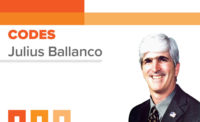Editor’s Note: We offer “Sound Off” as an open forum for industry professionals to express their opinions about industry issues, as well as to offer advice to our readers on how to manage their businesses. To submit material for this column, contact Managing Editor Kelly Johnson at johnsonk@bnp.com.
Six members of the Code Study and Development Committee of Southeastern Michigan attended the Residential Plumbing Code hearings and the International Plumbing Code hearings. They were John Matthews, P.E., CIPE; Paul Frost, Plumbing Inspector, City of Southfield; John R. Nussbaum, IPP, FASSE, consultant; Ronald L. George, CIPE; Carl Schroeder, director of training for Plumbers Local 98, currently serving on the IPC Committee; and Gil Wilkinson, instructor at Plumbers Local 98 Training Center.
Though the Residential Plumbing Code committee was slightly improved over last year, it was evident that the RPC is a waste of valuable time and resources for ICC staff, attendees and members of the committee. This writer, who has attended these hearings for several years, still believes that plumbing does not know the structure it is serving and should be promulgated through the IPC process by adding the appropriate people to the IPC--homebuilders and master plumbers, whose business is centered on residential construction. The International Plumbing Code hearings are sufficient to compile the Residential Plumbing Code, eliminating the need for coordination. The IPC Committee members, whether tradesmen, code officials, plumbing design professionals, manufacturers, homebuilders, or contractors, are capable of providing a consensus opinion in their desire to keep the codes up to date. The process is thought to be the checks and balances that protect the system from abusers. During the hearings, a builder member of the IRC showed his disrespect for those who promulgate the codes by his comment that the IPC members were attempting to contaminate the residential plumbing and building code. It is regretful that the chairman and moderator chose not to say anything concerning this kind of behavior.
The IPC hearings started on time and were professionally handled by the chairman, Jimmy Brothers of Decatur, AL. The hearings were scheduled to end at 5:00 p.m. but did not finish until about 8:00 p.m. Items slowing the process dealt with hot water scalding, standards, hot water heaters, mixing valves to be or not to be, temperature settings and Legionella. On most of the aforementioned, the proposals were denied and ultimately will be rewritten and proposed in future hearings. An ad-hoc committee was proposed to study the issues and look for answers for protection from scalding in hot tubs, bathtubs and fixtures that children frequently use. Other means that slowed the process were those people trying to write code language from the floor.
Some members of the IPC and RPC gave the appearance they had not done their preparation for the hearings. The Plumbing Design Professional Committee members appeared to many as if they had no idea of how application of their skills in the science and theory of plumbing should be applied using plumbing codes in the design of plumbing systems. They made little comment and had to glance at other members prior to voting or speaking to the proposed change. It would help a great deal to have people who have previously attended the hearings be appointed to serve on the committees. People who have never been exposed do not have the experience of knowing how the system works. Screening, not politics, would go a long way to improve the makeup of the committees. ICC staff members should be asked to assist in the screening and appointments.
Between Virginia and the Code Study and Development Committee of Southeastern Michigan, they provided much of the floor testimony throughout the hearings, being well prepared and ready to participate. The Code Study and Development Committee of Southeastern Michigan (CSDSM) has emerged as an influential and respected group at the code hearings for their contributions and participation. Many hours of preparation, prior to attending the hearings, have contributed to CSDSM’s success. CSDSM has been a participant starting with BOCA International in the late 1980s and early 1990s (PHCCASM was the organizing body). As evidenced by our successes, CSDSM is able to provide some additional views or opinions for positive changes to the codes working through the ICC code change process.
During the years that the Code Study & Development Committee of Southeastern Michigan has participated in the code change process, it has not sent its members to the hearings with a predetermined agenda to vote on but encouraged them to listen to the assembly/floor testimony and to that of the National Committee members prior to voting on the proposed change, the reason being that they may hear testimony that could change their way of thinking on the proposed change. One should be advised that, at the hearings, they could be privy to information and viewpoints from individuals who are practitioners in their related fields that they may not have heard while in their own study sessions back home.
This year, hearing 100 proposed changes, CSDSM agreed with the IPC committee 70 times. That’s quite an accomplishment by our members who attended the Code Study and Development Committee meetings held at PMC’s Detroit Conference Center in March and April.
CSDSM had submitted 17 changes, of which five had been withdrawn. The IPC committee had voted “As Submitted” on three of our committee’s proposed changes and two as modified, thus having five advancing to the final phase in September--quite an accomplishment for our second effort.
CSDSM will be looking to expand its meetings by having separate meetings to deal with the Residential Plumbing Code.
CSDSM is in the process of writing procedures for the review process and conduct at the hearings. CSDSM will attempt to have eligible voting people at the code challenge hearings. This will be in September of 2002. Others are welcome who can give floor testimony and vote either for or against the proposed challenges.
